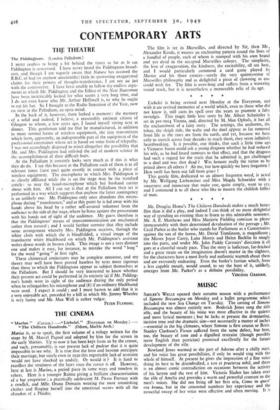THE CINEMA
Marius." (Curzon.)—"Liebelei." (Everyman on Monday.)- •• The Chiltern Hundreds." (Odeon, Marble Arch.) Marius is, so to speak, the first volume of a trilogy written for the stage by M. Marcel Pagnol and adapted by him for the screen in the early 'thirties. Up to now it has been kept from us by the censor, and such, presumably, is our present lack of pudeur that it is quite impossible to see why. It is true that the hero and heroine anticipate their marriage, but surely even in 193o this regrettable lack of restraint would not have shocked us unduly. Or would it ? It is hard to recollect the straitness of the laces once the corset is off. However, hcrc at last is Marius, a period piece in some ways and timeless in others. Here is a younger Raimu giving a brilliant characterisation of a bar proprietor ; a practically adolescent M. Pierre Fresnay with a cowlick, and Mlle. Orana Demazis wearing the most astonishing clothes and flinging herself into the emotional scenes with all the abandon of a Phedre.
The film is set in Marseilles, and directed by Sir, then Mr., Alexander Korda, it weaves an enchanting pattern round the lives of a handful of people, each of whom is stamped with his own brand and yet dyed in the accepted Marseilles colours. The simplicity, the love of exaggeration, the kindness, the excitability, all arc here, and I would particularly commend a card game played by Marius and his three cronies—surely the very quintessence of Marseilles philosophy and as delightful a piece of clowning as one could wish for. The film is over-long and suffers from a wavering sound track, but it is nevertheless a memorable relic of its age.
* * * * Liebelei is being revived next Monday at the Everyman, and with it are revived memories of a world which, even to those who did not know it, still casts its spell over the years to promote a false nostalgia. This tragic little love story by Mr. Albert Schnitzler is set in pre-1914 Vienna, and, directed by M. Max Ophuls, it has all the enchantment of a fairy story. The settings, the uniforms, the tokay, the sleigh ride, the waltz and the duel appear as far removed from life as the stars are from the earth, and yet, because we have only to stretch across four decades to reach them, they seem infinitely heartbreaking. Is it possible, one thinks, that such a little time ago a Viennese baron could ask a young dragoon whether he had seduced his wife, as he had heard rumours to that effect, and that the dragoon had such a regard for the truth that he admitted it, got challenged to a duel and was shot dead ? Was honour really the virtue to be prized above all others ? Ah me, but how quickly we have forgotten ! How swift has been our fall from grace !
This gentle film, dedicated to an almost forgotten word, is acted by Mr. Wolfgang Liebeneiner and Miss Magda Schneider with a sweetness and innocence that make one, quite simply, want to cry, and I commend it to all those who like to mourn the childish follies of man.
* * * Mr. Douglas Home's The Chiltern Hundreds makes a much better film than it did a play, and indeed I can think of no more delightful way of spending an evening than to listen to this admirable nonsense. Mr. A. E. Matthews and Miss Marjorie Fielding continue to please immeasurably with their determined devaluation of the peerage ; Mr. Cecil Parker as the butler who stands for Parliament as a Conservative against the son of the house, Mr. David Tomlinson, is magnificent ; the Misses Joyce Carty, Lana Morris and Helen Backlin fit snugly into the parts, and under Mr. John Paddy Carstairs' direction it all goes at a cheerful steady pace. That the story is ludicrous, far-fetched and a great strain on the imagination doesn't matter in the slightest, for the characters have a most lively and authentic warmth about them and are extremely endearing. Even the butler's fustian which, from a less capable mouth, would sound, to say the least of it, unlikely, emerges from Mr. Parker's as a definite possibility.
VIRGINIA GRAHAM.














































 Previous page
Previous page